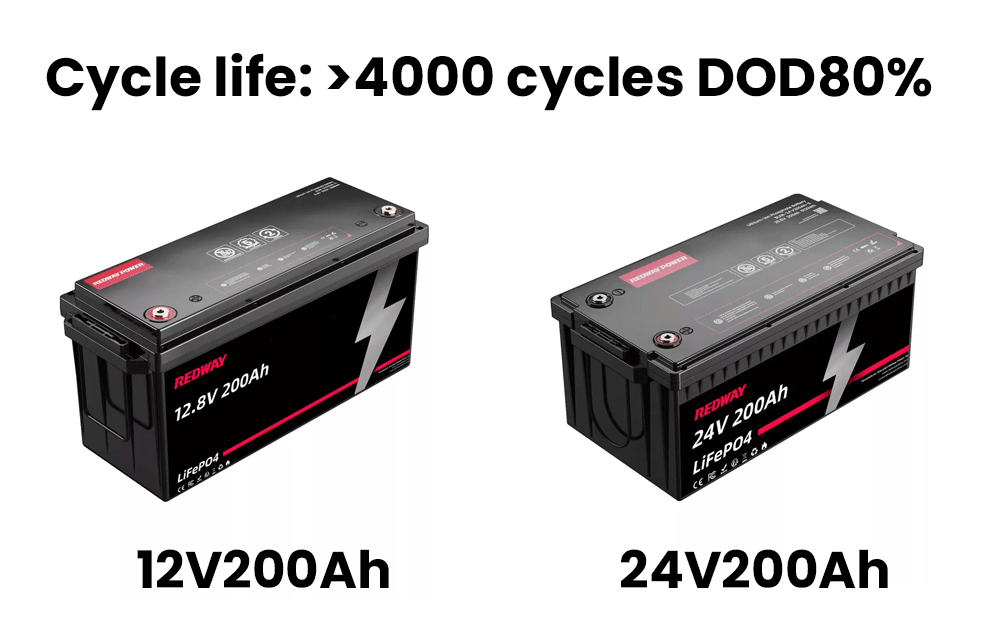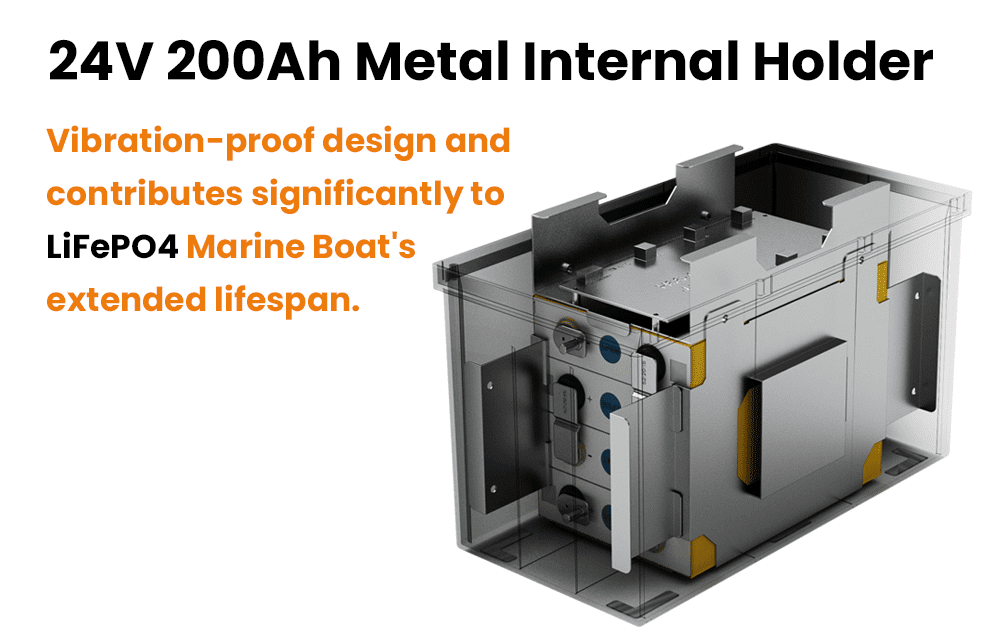The lifespan of a 200Ah LiFePO4 (Lithium Iron Phosphate) battery can vary depending on several factors, including the number of charge and discharge cycles, the charging method, the temperature of operation, and the depth of discharge.
In general, a high-quality 200Ah LiFePO4 battery can last between 2,000 and 5,000 charge and discharge cycles, depending on the specific battery and its usage conditions. If the battery is cycled once per day, this can translate to a lifespan of 5 to 15 years.
However, it’s important to note that the actual lifespan of the battery can be influenced by many factors, including the quality of the battery, the temperature of operation, the depth of discharge, and the charging and discharging current. Proper care and maintenance of the battery, including following the manufacturer’s instructions for charging, storage, and usage, can help maximize its lifespan. As a lithium iron phosphate battery wholesaler operating from China, Redway Power (ISO9001:2015) introduces its versatile LiFePO4 Battery suitable for various applications, such as RV, Sightseeing Carts, Marine, Scooters, Tricycles, Emergency lighting, and Security Monitoring.
The RV 12V 200Ah LiFePO4 battery is a popular choice among RV enthusiasts due to its impressive features and benefits
1. Lithium Iron Phosphate (LiFePO4) Chemistry: This type of battery chemistry offers several advantages over traditional lead-acid batteries. LiFePO4 batteries are known for their higher energy density, longer lifespan, and better performance in various temperature conditions. They are also safer and more environmentally friendly.
2. Capacity: The 12V 200Ah capacity indicates the amount of energy the battery can store. With 200Ah capacity, this battery can provide a substantial amount of power, making it suitable for powering various appliances and devices in an RV for extended periods without needing a recharge.
3. Voltage: Being a 12V battery, it’s compatible with most RV systems, allowing for easy integration without requiring complex modifications to the electrical setup.
4. Lightweight and Compact: Compared to traditional lead-acid batteries, LiFePO4 batteries are lighter, which is beneficial for RVs where weight is a crucial factor. Additionally, they are more compact, providing flexibility in installation options.
5. Longevity: LiFePO4 batteries generally have a longer lifespan compared to lead-acid batteries. They can withstand a higher number of charge-discharge cycles, often exceeding 2000 cycles, depending on usage and maintenance, which means they can last for many years.
6. Fast Charging: LiFePO4 batteries typically support faster charging compared to other battery types, reducing the time needed to recharge while on the road.
7. Maintenance and Safety: They require minimal maintenance and are safer than other lithium-ion battery chemistries, with a lower risk of thermal runaway or fire.
When using a LiFePO4 battery in an RV, it’s essential to ensure compatibility with the charging system and consider a battery management system (BMS) to optimize performance, monitor individual cell voltages, and protect against overcharging or discharging.
Overall, the RV 12V 200Ah LiFePO4 Battery offers a reliable, high-capacity power solution for RVers looking for efficiency, longevity, and performance during their travels.
The marine boat 24V 200Ah LiFePO4 battery shares many advantages with its 12V counterpart while offering additional benefits specific to marine applications
1. Voltage: As a 24V battery, it’s designed for marine systems that require higher voltage setups. This voltage level is often preferred in larger boats or yachts to power various onboard equipment efficiently.
2. High Energy Capacity: With a capacity of 200Ah, this battery can store a significant amount of energy, ideal for extended periods on the water, powering navigation systems, electronics, lights, pumps, and other marine accessories.
3. Lightweight and Space-Efficient: Similar to the 12V version, the LiFePO4 chemistry makes the battery lighter and more compact than traditional lead-acid batteries. This is advantageous for boats where space and weight are critical considerations.
4. Long Lifespan: LiFePO4 batteries are known for their durability and longevity. In the demanding marine environment, where batteries undergo frequent charge-discharge cycles and face varying weather conditions, the extended lifespan is a significant advantage.
5. Resistance to Harsh Conditions: LiFePO4 batteries perform well in a range of temperatures and are more resistant to temperature fluctuations, making them suitable for marine use where conditions can be harsh and unpredictable.
6. Fast Charging: These batteries typically support faster charging, which is convenient for marine applications when time at the dock may be limited.
7. Safety and Maintenance: LiFePO4 batteries have inherent safety features and require minimal maintenance compared to other battery types. This is particularly beneficial for marine settings, where ease of maintenance and safety are crucial.
8. Redway Battery incorporating a metal internal holder in the design of the Marine Boat 24V 200Ah LiFePO4 Battery plays a crucial role in its vibration-proof design and contributes significantly to its extended lifespan:
(1) Metal Internal Holder: Utilizing a metal internal holder within the battery’s construction provides structural reinforcement and support to the LiFePO4 cells. This holder securely encases the individual cells, keeping them in place and minimizing movement or shifting, even amidst continuous vibrations experienced in marine environments.
(2) Enhanced Vibration Resistance: The metal holder acts as a sturdy framework, effectively dampening vibrations and absorbing shocks experienced during the operation of the boat. This design feature ensures that the sensitive internal components of the battery, particularly the LiFePO4 cells, are well-protected from potential damage caused by vibrations.
(3) Reduced Wear and Tear: By minimizing internal movement, the metal internal holder helps in reducing wear and tear on the battery’s components. This, in turn, contributes to the longevity of the LiFePO4 cells, allowing them to endure a higher number of charge-discharge cycles without deteriorating prematurely.
(4) Extended Life of LiFePO4 Battery: The combination of a vibration-proof design with a metal internal holder significantly extends the overall lifespan of the LiFePO4 battery. It ensures that the battery can consistently deliver reliable performance over an extended period, making it a durable and long-lasting power solution for marine applications.

In essence, the incorporation of a metal internal holder in the marine boat 24V 200Ah LiFePO4 battery’s design reinforces its resistance to vibrations, enhances its durability, and contributes significantly to the extended lifespan of the LiFePO4 cells, ensuring a reliable power supply for marine systems and electronics.
When using a 24V 200Ah LiFePO4 battery in a marine environment, ensuring proper charging systems, voltage compatibility, and integrating suitable BMS becomes essential to optimize performance, extend battery life, and ensure safety.
Overall, the marine 24V 200Ah LiFePO4 battery serves as a reliable, high-capacity power solution for larger boats and yachts, offering efficiency, durability, and performance for extended periods on the water.

